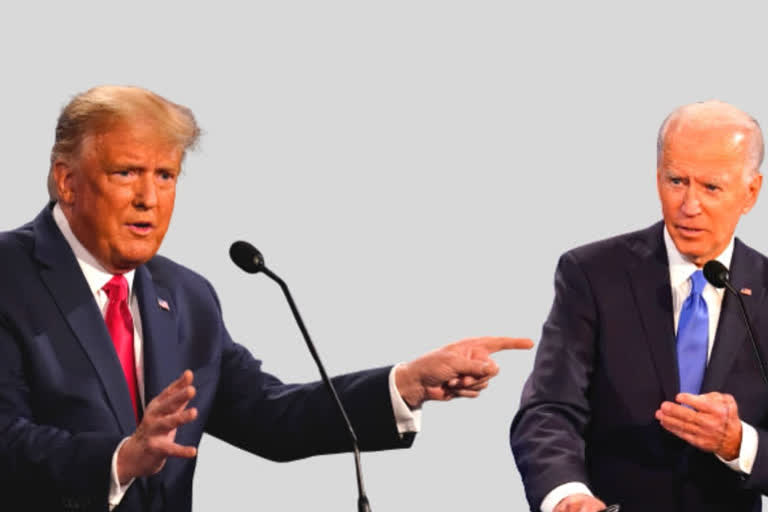Hyderabad: The United States democracy, in particular its elections process, is going through its most delicate phase. Over the years, the United States Presidential Elections were known for their excellent policy debates between the leading contenders, remarkably free, fair and open elections, and there was never an iota of doubt regarding the peaceful transfer of power after the elections.
Given the robust electoral democracy at home, the United States often took moral-high ground in international politics and used to chastise various countries across the world for failing to conduct clean elections and ensuring a peaceful transfer of power. Today, the world looks aghast at the deterioration in the US election process.
The political rhetoric in US politics has descended to new low as political opponents are abusing each other as criminals and clowns. The first presidential debate was acrimonious, and there was very little discussion on actual policies between the two contesting presidential candidates. Given the pandemic, a fairly large number of people are voting through absentee ballots.
However, President Trump and others have expressed doubts that these absentee ballots and mail-in provisions are being misused. Political leaders from across the spectrum from various are reaching out to the US Supreme Court with litigations arguing that ballot procedures are being violatedor requesting for relaxation of procedures. These developments hint that after the voting there could be prolonged court battle before the results are formalized.
In the midst of all these developments, President Trump did not commit to easy transfer of power. When asked by journalists, he stated that "I've been complaining very strongly about the ballots...and the ballots are a disaster...Get rid of the ballots, and you'll have a very - you'll have a very peaceful - there won't be a transfer, frankly, there'll be a continuation." The fact that the US President did not answer in affirmative that there would be a peaceful transfer of power generated dismay in various world capitals.
Read:Trump to escalate campaigning as Biden steps up own travel
To compound the misery, these elections are taking place in the midst of a pandemic. As a consequence, the usual election activities such as door-to-door campaigns, mega political rallies and other related events were curtailed. However, President Trump went ahead and organised big meetings and claimed that Democrats are not organising similar events because they are not getting big crowds. There is considerable debate in the US today on the nature of an election campaign that should be conducted in the midst of a pandemic. In fact, Trump's approach of moving freely and interacting with a large number of people, before and after contracting COVID-19, has become a deeply contentious issue.
The US government response to the pandemic is an important political issue in the presidential elections. The Democratic Party nominee Joe Biden sharply criticised the current administration for lackadaisical attitude and for failing to protect American people by taking appropriate action to contain the spread of the pandemic. On the other hand, Trump often terms COVID-19 as a "China virus". Such characterisation is an attempt to give credence to the argument that there was a lack of information flows from China about the impending crisis in a timely manner, which contributed to the fatalities in the US.
Further, Trump argues that imposing harsh lockdown would negatively impact the health of the national economy. In the past few days, Trump has argued that theeconomy is picking up momentum after a slowdown due to the pandemic. It is still not certain as to how people who suffered economically due to the pandemic will vote in the upcoming elections. It is possible that some of them may find Trump's argument of downplaying the pandemic and focus more on allowing the economy to function little more appealing. Interestingly, in a Gallup survey in early October, approximately 54 per cent of Americans felt that Trump's job performance on the economy was good.
Read:Biden calls Russia 'biggest threat' to America
Various pre-election surveys suggest that Joe Biden is way ahead (almost by 9 to 10 per cent) of President Trump in the nationwide polls. On the other hand, in battleground states, the contest between the two contenders seems to be becoming very narrow. According to some polls, in Florida, North Carolina, and Arizona Joe Biden is leading by less than three per cent margin. In Iowa and Ohio Trump is leading by less than two per cent margin. These numbers could change in the coming days.
It should be noted that during the previous presidential elections around this time, Senator Hillary Clinton had a clear lead over her rival Donald Trump in various pre-election surveys. However, the election results demonstrated that the pollsters/surveyors could not accurately capture the mood of the nation. In a highly polarised environment, predicting election results is becoming a difficult enterprise. Moreover, in these elections, there was considerable early voting, which is making it difficult to predict the electoral outcomes.
